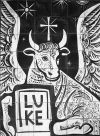
The Gospel of Luke
The True Disciple: Lk 6,39-45
Following his teaching of the Beatitudes and the command to love enemies, Jesus now draws out the meaning of this teaching with a parable. That the noun in verse 39 is in the singular indicates that the whole part is to be read as one parable. The emphasis is on the values that lie behind the teaching of the first two parts. The presupposition is that character precedes action (6,43-44): what a someone does is an indication of where their heart is.
There are three sayings or parables which are thus introduced as one parable (6,39). The message of all three is to be taken as a whole.
6,39-42 on true sight.
6,43-45 on fruits.
6,46-49 on foundations.
The message therefore is that to be a teacher one must first be a disciple. Disciples hear the word of the Lord (6,47), disciples know their teacher (6,40), disciples know themselves (6,41) and so are able to bear good fruit (6,43-45).
With this positive presentation, Luke has omitted the negative comments in Matthew, Mt 7,15-16 and Mt 7,21-23, about false prophets.
In practical terms, a blind person may well fall into the pit as in verse 39. This must not be taken further as a comment about those who are sight impaired. Blindness need not be an impediment to a full and fulfilled life. The blind can be great spiritual guides. Notably, in the Carmelite tradition, we have John of Saint Samson in 17th century France.
Luke has recast the image of the fruits from Matthew to give his positive stress. He omits references to false prophets and emphasises what comes from the heart, deep within, 7,45.
In the final image, there is a notable emphasis on foundations, verses 48 and 49. Hearing the word from the heart (verse 45) comes from digging deeply (verse 48).
The formal ending of the sermon comes in 7,1 where we hear that Jesus has finished all his words. This is similar to the way Matthew ends his discourses, the conclusion to the Sermon on the Mount, Mt 7,28, would be a typical example.
Now let us now return to the main page
The Sunday Gospel
Apart from the parable at the end, this third part of the sermon (6,39-45) forms the Gospel for the 8th Sunday of the Year
The parable of the building, 6,45-49, may be omitted probably because it is so similar to Matthew's more dramatic version (Mt 7,21-27) which is read on the 9th Sunday, cycle A. Yet we have seen how this parable is an integral part of the Sermon on the Plain.
Ecclesiasticus means the Church's book because the Church found it such a valuable source of teaching (despite a number of passages such as chapter 26 which are notably misogynist). It's Old Testament name is the Wisdom of Ben Sirach. Like all wisdom books, it teaches a practical guide to life. Thus "the test of a man is in his conversation" fits well with this Sunday's Gospel.
Now return to the main page
